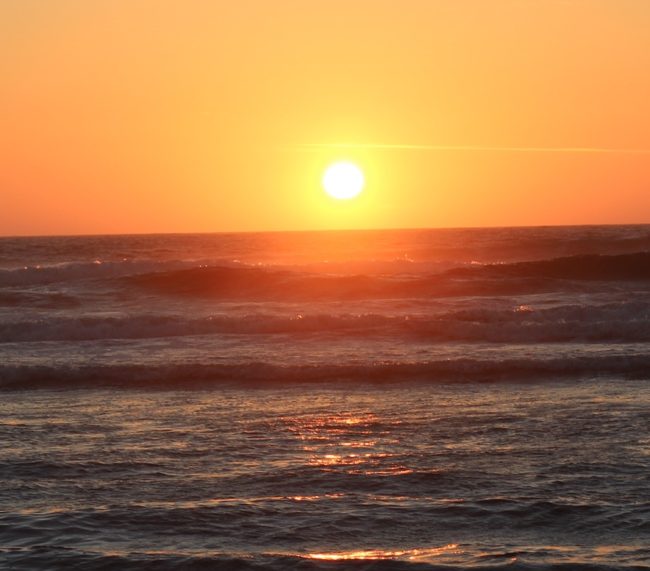
Marine heatwaves that greatly impact ecosystems are quite real. It is perhaps a surprise to some that prolonged extreme warming events occur in the ocean as well as the atmosphere and yet in a warming world this should not be a surprise. I’ve written about these before.
The latest news is that there is a new study that has once again thrown a spotlight upon them. Marine heatwaves – periods of anomalously high ocean temperatures – have been increasing in frequency, with 54% more heatwave days per year from 1987–2016, than from 1925–1954, yet their impacts on species and ecosystems has not been understood all that well. This new study addresses that.
The Study
The paper published online this week in Nature Climate Change is the first to quantify and contrast the magnitude and impacts of several prominent marine heatwaves using the same methods and metrics.
What did they discover?
The title of the paper reveals the answer – “Marine heatwaves threaten global biodiversity and the provision of ecosystem services“
The study, led by Dr Dan Smale of the Marine Biological Association (UK) involving scientists from 7 different countries representing 19 different institutes. They found that marine heatwaves vary in their physical manifestations, yet all affect key species and alter ecosystem structure and functioning.
The abstract
The global ocean has warmed substantially over the past century, with far-reaching implications for marine ecosystems1. Concurrent with long-term persistent warming, discrete periods of extreme regional ocean warming (marine heatwaves, MHWs) have increased in frequency2. Here we quantify trends and attributes of MHWs across all ocean basins and examine their biological impacts from species to ecosystems. Multiple regions in the Pacific, Atlantic and Indian Oceans are particularly vulnerable to MHW intensification, due to the co-existence of high levels of biodiversity, a prevalence of species found at their warm range edges or concurrent non-climatic human impacts. The physical attributes of prominent MHWs varied considerably, but all had deleterious impacts across a range of biological processes and taxa, including critical foundation species (corals, seagrasses and kelps). MHWs, which will probably intensify with anthropogenic climate change3, are rapidly emerging as forceful agents of disturbance with the capacity to restructure entire ecosystems and disrupt the provision of ecological goods and services in coming decades.
Illustrations
The following illustrations from the paper perhaps tell you the story of this rising tide of ocean heatwaves far better than words alone …


The impact is real and it is here now
From the paper …
An examination of long-term time series on the health of three globally important foundation taxa showed that increased annual number of Marine Heatwave days was correlated with (1) increased coral bleaching, (2) decreased seagrass density and (3) decreased kelp bio- mass. Even though environmental variables such as storms, nutrients and light are known to strongly influence the health of these critical habitat-formers, the annual number of Marine Heatwave days alone was strongly and significantly correlated with observed ecological performance and, crucially, had consistently stronger correlative relationships than more frequently used measures of ocean temperature. An increased number of Marine Heatwave days was significantly correlated to decreased ecological health of populations of all three foundation taxa, indicating the importance of discrete extreme ocean warming events in driving ecosystem structure.
… and even more importantly, this …
Globally, Marine Heatwaves are becoming more frequent and prolonged, and record-breaking events have been observed in most ocean basins in the past decade …. discrete extreme events are emerging as pivotal in shaping ecosystems, by driving sudden and dramatic shifts in ecological structure and functioning. Given the confidence in projections of intensifying extreme warming events with anthropogenic climate change, marine conservation and management approaches must consider Marine Heatwaves and other extreme climatic events if they are to maintain and conserve the integrity of highly valuable marine ecosystems over the coming decades.
Additional Author Comments
Dr Smale, the lead author said that extreme temperatures experienced during marine heatwaves can have adverse effects on marine organisms, leading to widespread mortality, species range shifts and changes to entire ecosystems and ecological processes.
“Ocean ecosystems currently face a number of threats, including overfishing, acidification and plastic pollution, but periods of extreme temperatures can cause rapid and profound ecological changes, leading to loss of habitat, local extinctions, reduced fisheries catches and altered food webs” Dr Smale said.
“The major concern is that the oceans have warmed significantly as a consequence of manmade climate change, so that marine heatwaves have become more frequent and will likely intensify over the coming decades. Just as atmospheric heatwaves can destroy crops, forests and animal populations, marine heatwaves can devastate ocean ecosystems”.
Further reading
- National Geographic (Mar 4th 2019) : Ocean heat waves are killing underwater life, threatening biodiversity
- Smithsonian (Mar 5th 2019) : Ocean Heat Waves Are Threatening Marine Life, Biodiversity
- Ars Technica (Mar 5th 2019): Ocean heat waves remake Pacific and Caribbean habitats
- Guardian (Mar 4th 2019) : Heatwaves sweeping oceans ‘like wildfires’, scientists reveal
- Marine Heatwave International Working Group website
